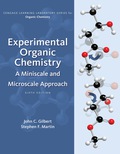
EBK EXPERIMENTAL ORGANIC CHEMISTRY: A M
6th Edition
ISBN: 9781305687875
Author: Gilbert
Publisher: CENGAGE LEARNING - CONSIGNMENT
expand_more
expand_more
format_list_bulleted
Question
Chapter 5.3, Problem 10E
Interpretation Introduction
Interpretation: The name and chemical structures of three functional groups (neutral and ionized forms) which can be ionized by changing the pH of the aqueous solution needs to be explained.
Concept Introduction: Functional groups are the groups of atoms or atoms which are bonded with parent carbon chain in the organic molecule and are responsible for the physical and chemical properties of the compound. In
Some of the functional groups can easily ionized in acidic medium and exist in both neutral and ionized form that depends on the pH of solution.
Expert Solution & Answer
Want to see the full answer?
Check out a sample textbook solution
Students have asked these similar questions
Why does the dehydration of an alcohol more often use concentrated sulfuric acid,
H2SO4H2SO4, as the acid catalyst rather than dilute hydrochloric acid,
HCl?
Select one or more:
Hydrochloric acid is too small to effectively react with the alcohol in the reaction.
The additional water solvent from a dilute solution could reverse the dehydration reaction.
Only acids with more than one proton can complete the dehydration reaction.
The presence of the chloride ion could result in a competing substitution reaction.
What can you conclude regarding the difference in degree of acidity and alkalinity between organic and inorganic compounds? ( sample substances are dilute hcl, dilute acetic acid, dilute nh4oh and aniline).
Phenols are aromatic rings with an alcohol functional group attached directly to the ring. These compounds have unique acidity and solubility for alcohol groups. Predict the solubility of this phenol in water.
Chapter 5 Solutions
EBK EXPERIMENTAL ORGANIC CHEMISTRY: A M
Ch. 5.3 - Prob. 1ECh. 5.3 - Prob. 2ECh. 5.3 - Prob. 3ECh. 5.3 - Prob. 4ECh. 5.3 - Prob. 5ECh. 5.3 - Prob. 6ECh. 5.3 - Prob. 7ECh. 5.3 - Prob. 8ECh. 5.3 - Prob. 9ECh. 5.3 - Prob. 10E
Ch. 5.3 - Prob. 11ECh. 5.3 - Prob. 12ECh. 5.3 - Prob. 13ECh. 5.3 - Prob. 14ECh. 5.3 - Prob. 15ECh. 5.3 - Prob. 16ECh. 5.3 - Prob. 17ECh. 5.3 - Prob. 18ECh. 5.3 - Prob. 19ECh. 5.3 - Prob. 20ECh. 5.3 - Prob. 21ECh. 5.3 - Prob. 22ECh. 5.4 - Prob. 1ECh. 5.4 - Prob. 2ECh. 5.4 - Prob. 3ECh. 5.4 - Prob. 4ECh. 5.4 - Prob. 5ECh. 5.4 - Prob. 6ECh. 5.4 - Prob. 7ECh. 5.4 - Prob. 8ECh. 5.4 - Prob. 9ECh. 5.4 - Prob. 10ECh. 5.4 - Prob. 11ECh. 5.4 - Prob. 12E
Knowledge Booster
Similar questions
- Chemical Equilibrium Write the equilibrium-constant expressions and obtain numerical values for each constant in (a) the basic dissociation of aniline, C6H5NH2. (b) the acidic dissociation of hypochlorous acid, HClO. (c) the acidic dissociation of methyl ammonium hydrochloride, CH3NH3Cl. (d) the basic dissociation of NaNO2. (e) the dissociation of H3AsO3 to H3O+ and AsO33- Using step-by-step processarrow_forwardSolubility- Using molecular structures, what will happen in the following situation: * Ethyl 4-aminobenzoate is dissolved in dichloromethane and then 1 M HCl (aq) is addedarrow_forwardWrite the equilibrium-constant expressions and obtain numerical values for each constant in(a) The basic dissociation of aniline, C6H5NH2.(b) The acidic dissociation of methyl ammonium hydrochloride, CH3NH3Cl.(c) The dissociation of H3AsO3 to H3O+ and AsO3^3-.arrow_forward
- 2.4 Why must some organic reactions occur in the absence of water? Describe how you can remove residual dissolved water from an organic solvent.arrow_forwardwhat is syn and anti in organic chemistry, and what is the importance of knowing it?arrow_forwardwhat is the solubility class and degree of unsaturation of myristic acid?arrow_forward
- Explain briefly the basic principle of Baeyer's Test and Jones Test for alcohols.arrow_forwardCan 3-hexanol be easily made from hexanoic acid via reduction why or why not when trying to oxidize a primary alcohol to an aldehyde, why do you have to carefully choose your oxidizing agent and/or reaction conditions? Why is this not an issue in biological organism? Fully describe why amines are based in organic chemistryarrow_forwardWrite the equilibrium-constant expressions and obtainnumerical values for each constant in. (a) the basic dissociation of aniline, C6H5NH2. (b) the acidic dissociation of hypochlorous acid,HClO. (c) the acidic dissociation of methyl ammoniumhydrochloride, CH3NH3Cl. (d) the basic dissociation of NaNO2. (e) the dissociation of H3AsO3to H3O+and AsO33-. (f) the reaction of C2O42-with H2O to give H2C2O4and OH-. show solutionarrow_forward
- Name the major chemical groups found in organic molecules. Describe the basic structure of each chemical group and outline the chemical properties of the organic molecules in which they occur.arrow_forwardSuggest a method of preparing ethyl benzene, starting with benzene and ethylene as the only organic reagents.arrow_forwardWhat is the solubility, the pH, and reaction of carboxylic acids?arrow_forward
arrow_back_ios
SEE MORE QUESTIONS
arrow_forward_ios
Recommended textbooks for you
 Chemistry: Principles and ReactionsChemistryISBN:9781305079373Author:William L. Masterton, Cecile N. HurleyPublisher:Cengage Learning
Chemistry: Principles and ReactionsChemistryISBN:9781305079373Author:William L. Masterton, Cecile N. HurleyPublisher:Cengage Learning Macroscale and Microscale Organic ExperimentsChemistryISBN:9781305577190Author:Kenneth L. Williamson, Katherine M. MastersPublisher:Brooks Cole
Macroscale and Microscale Organic ExperimentsChemistryISBN:9781305577190Author:Kenneth L. Williamson, Katherine M. MastersPublisher:Brooks Cole Chemistry: The Molecular ScienceChemistryISBN:9781285199047Author:John W. Moore, Conrad L. StanitskiPublisher:Cengage Learning
Chemistry: The Molecular ScienceChemistryISBN:9781285199047Author:John W. Moore, Conrad L. StanitskiPublisher:Cengage Learning Organic ChemistryChemistryISBN:9781305580350Author:William H. Brown, Brent L. Iverson, Eric Anslyn, Christopher S. FootePublisher:Cengage Learning
Organic ChemistryChemistryISBN:9781305580350Author:William H. Brown, Brent L. Iverson, Eric Anslyn, Christopher S. FootePublisher:Cengage Learning

Chemistry: Principles and Reactions
Chemistry
ISBN:9781305079373
Author:William L. Masterton, Cecile N. Hurley
Publisher:Cengage Learning

Macroscale and Microscale Organic Experiments
Chemistry
ISBN:9781305577190
Author:Kenneth L. Williamson, Katherine M. Masters
Publisher:Brooks Cole

Chemistry: The Molecular Science
Chemistry
ISBN:9781285199047
Author:John W. Moore, Conrad L. Stanitski
Publisher:Cengage Learning

Organic Chemistry
Chemistry
ISBN:9781305580350
Author:William H. Brown, Brent L. Iverson, Eric Anslyn, Christopher S. Foote
Publisher:Cengage Learning